“Mission Accomplished” – Edward Snowden
To comprehend this phrase, one has to familiarize themselves with history (of the manipulation of social issues, foreign relations, and political warfare) , strategic information strategies (what they are, how they are used, and why they are used), and the Snowden affair itself (timeline of events, nuances in statements, and general actions). Once these variables are illuminated and arranged, the picture becomes quite clear. Thus, validating General Hayden’s remarks that cast Snowden as a traitor, and not a defector.
History
Social Issues
Social issues should be of the utmost importance for any foreign relations experts. Believe you me when I say, the Edward Snowden debacle has more to do with foreign relations than it does dealing with the constitutionality of how we gain leverage over those who wish to do the United States wrong. Let’s explore what could possibly be gained by stoking the fires of social issues in the United States. Three critical insights can be gleaned from following social issues:
1) The mood of the people concerning specific topics.
2) The context of the issues that make up the topic.
3) Who are the active voices within the community.
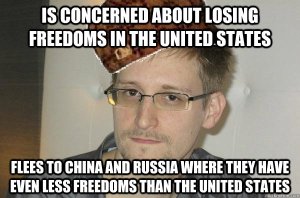 From these three insights, we can find multiple opportunities at which a leader can effectively use his communication skills to harness these issues to ‘nudge’ an intended reaction from an audience; in order to secure a more beneficial position. Historically speaking many countries, rulers, and empires have used these tactics throughout human history as a means of legitimize an opposition force. However, to make article as relevant as possible, we will focus on the Russian use of these political operations and the context at which they were used to affect US foreign policy.
From these three insights, we can find multiple opportunities at which a leader can effectively use his communication skills to harness these issues to ‘nudge’ an intended reaction from an audience; in order to secure a more beneficial position. Historically speaking many countries, rulers, and empires have used these tactics throughout human history as a means of legitimize an opposition force. However, to make article as relevant as possible, we will focus on the Russian use of these political operations and the context at which they were used to affect US foreign policy.
Foreign Relations
The immediate post World War II security environment produced foreign relations dilemmas on a scale that the world has never seen throughout all of humanity’s history. City-smashing nuclear weapons were at the front of everybody’s minds, as the world watched in a frightening awe at the two biggest superpowers pitting themselves against each other in an all out arms race to face each other in a head on competition. However, that was actually only a small part of the greater geopolitical picture. Gains from the United States and Soviet forces weren’t entirely made by intimidating nuclear stockpiles, but in low intensity conflicts that burned like a wild fire through third world countries.
It is important to note that the United States was dragged into this global war, despite its objections and hesitation to engage. This is because WWII-era fascism and communism had global plans which would not only put the US at a strategic disadvantage on the world stage, but also threaten the very existence of the United States, if their goals were met.
 While the United States was engaged in Korea and Vietnam, the Soviet forces made no hesitation to spread their influence through the Middle East and Africa, as well as, South America, while the U.S. was occupied. It was a brilliant move on the Soviets behalf, as they helped stoke the fires that led to US involvement in those areas. Pitching an enemy into a protracted state of guerilla warfare has been a maxim in warfare for over 2,500 years. The Western mind seems to fail to understand this maxim.
While the United States was engaged in Korea and Vietnam, the Soviet forces made no hesitation to spread their influence through the Middle East and Africa, as well as, South America, while the U.S. was occupied. It was a brilliant move on the Soviets behalf, as they helped stoke the fires that led to US involvement in those areas. Pitching an enemy into a protracted state of guerilla warfare has been a maxim in warfare for over 2,500 years. The Western mind seems to fail to understand this maxim.
Taking these areas were of vital importance, not so much because they offered their military the greatest geographic positioning, but because these areas provided strategic resources which all countries need to stabilize, grow, and sustain their economies, that which all the strength of the nation is dependent upon.
This was no simple task. In order to make such great territorial gains without provoking an all out military response by the United States and vice versa, the superpowers and their proxy forces fought using the methods of guerilla warfare to secure power in these regions.
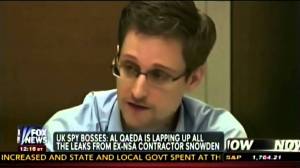 Given the nature of a guerilla war, the fighters are heavily dependent upon the use of information as a means to secure support of the local people, as a well as coercing the sitting rulers. Because information is their greatest weapon, it is also their biggest vulnerability. (Something to think about for a moment while we fight GWOT without USIA).
Given the nature of a guerilla war, the fighters are heavily dependent upon the use of information as a means to secure support of the local people, as a well as coercing the sitting rulers. Because information is their greatest weapon, it is also their biggest vulnerability. (Something to think about for a moment while we fight GWOT without USIA).
Political Warfare
To keep it simple, political warfare is a type of engagement of that is taken against an opposition force that is intended to coerce any type of ruling party’s actions. While there are many ways to do this for a great sized nation state, but if the resource supply of the actor is not vast, then it must resort to more informational means to recruit members, attack the enemy, and manipulate their actions.
A good example of the Soviet use of political warfare can be seen by their aid to people like Bill Ayres and Bernadine Dohrn’s Weather Underground movement, which was handled by Cuban Intelligence, which was puppet to the KGB, as explained in a previous piece. The use of empowering individuals such as Che Guevara and Fidel Castro illustrate the effects of finding the right active voices in a crowd and effectively handling to make significant changes within a political establishment.
Information Strategies
What are they?
 Information strategies are strategies that utilize information; in order to, secure better positioning, by altering the understanding a target perceives their environment; in the hopes of, coercing the target to take an intended action or set of actions. In the old Soviet playbook, they called these operations Active Measures. The Soviet intelligentsia used these operations worldwide.
Information strategies are strategies that utilize information; in order to, secure better positioning, by altering the understanding a target perceives their environment; in the hopes of, coercing the target to take an intended action or set of actions. In the old Soviet playbook, they called these operations Active Measures. The Soviet intelligentsia used these operations worldwide.
How they are used?
These operations utilize terrorism, false flag attacks, rumors, forgeries, and manipulating the presentation of current event. Pretty much, it is the practice of government sanctioned deception. While issues that deal with covert action are a classified issue, we can still see the softer informational aspects of these actions played out today in Russia’s government funded media sources, and how they spread through social media sphere. To determine their effectiveness, we can turn back to social media to glean the public’s reactions to the crafted information.
Why are they used?
There are multiple reasons to use an information strategy in conjunction with your over all grand strategy. Information is an element of national power. It helps bind a national identity through cultivating common and shared understandings of how to deal with issues. We have all heard the term to divide and conquer, but how many of us understand the dividing aspect? 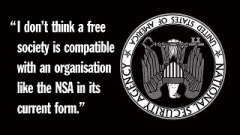
In the book, Dismantling Tyranny: Transitioning Beyond Totalitarian Regimes, the picture is painted quite clearly. To be successful in regime change, one has to uproot the existing security apparatus and replace it with a new one. Post-Soviet Russia failed to make this transition after the ‘collapse’ of the USSR. The new democratic elite was quickly exiled. Even George Soros stood idly by while they asked for help. Since then, Fmr. KGB elite, Vladimir Putin has been at the helm, and it is no coincidence that Russian foreign policy has continued using deceptive information practices to secure a better positioning in the eyes of the global population. To some degree, the Russians have been widely successful at altering the perspective of events. The latest being in the handling of the Edward Snowden’s defection.
The Snowden Affair
Timeline
Seeing as Edward Snowden had a comfy job living in Hawaii and making a more than generous income, he still found the need to defect. He claims to have defected for ideological reasoning, but that excuse should be carefully scrutinized.
The portrayal of the Snowden narrative, in the eyes of many, is that the United States has built a runaway spy machine, that operates above law set forth the US Constitution, and whose sole responsibility is to spy on U.S. citizens. This couldn’t be further from the truth, but the argument is none the less purposely spun to garner support to push the U.S. Government into taking actions that would diminish our security and embolden Russia.
Nuances in Statements
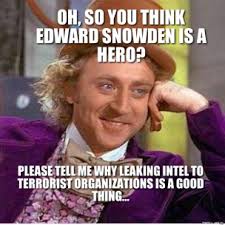 Since Glen Greenwald’s expose of the Snowden affair, the US intelligence community has been facing fierce criticism, especially NSA. Calls to diminish their capabilities and the agency as a whole are typical statements when talking about what it is they do. Before Edward Snowden’s public defection, very few people knew anything, if something, about the NSA. This poses somewhat of a circumstantial problem for NSA, as thier work provides a strategic and tactical edge over those who wish to do this country wrong. If the only thing you are known for is spying on the US people and they never know of the things that NSA has done to secure this nation, then they are most likely going to advocate to dismantle it.
Since Glen Greenwald’s expose of the Snowden affair, the US intelligence community has been facing fierce criticism, especially NSA. Calls to diminish their capabilities and the agency as a whole are typical statements when talking about what it is they do. Before Edward Snowden’s public defection, very few people knew anything, if something, about the NSA. This poses somewhat of a circumstantial problem for NSA, as thier work provides a strategic and tactical edge over those who wish to do this country wrong. If the only thing you are known for is spying on the US people and they never know of the things that NSA has done to secure this nation, then they are most likely going to advocate to dismantle it. 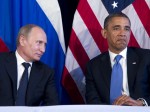 May President Obama hear the calls from General Hayden to reconsider restructuring efforts at NSA, instead of taking the Russian’s bait.
May President Obama hear the calls from General Hayden to reconsider restructuring efforts at NSA, instead of taking the Russian’s bait.
Along with the criticism of the NSA, Russia has began building their own techno-savy spynet with the aid of Snowden’s acts of treason. He has claimed that his mission is accomplished, as if it were some pre-planned operation designed to hurt the US. Can we not see that for what it is, and say it?
General Actions
Everybody spies,  the Russians, the Brits, the Chinese, the Cubans, the French, the Israelis, the Iranians, etc. EVERYBODY does it. Matter of fact, many of the countries that we were spying in were helped by those very countries to spy on the terrorists networks in their countries. Nobody is really shocked as to the extent of our capabilities, just when the cameras are on. Their true emotions are much more of the jealous nature. Who doesn’t wish they had these capabilities for their nation to project power? So why reform? The system works.
the Russians, the Brits, the Chinese, the Cubans, the French, the Israelis, the Iranians, etc. EVERYBODY does it. Matter of fact, many of the countries that we were spying in were helped by those very countries to spy on the terrorists networks in their countries. Nobody is really shocked as to the extent of our capabilities, just when the cameras are on. Their true emotions are much more of the jealous nature. Who doesn’t wish they had these capabilities for their nation to project power? So why reform? The system works.

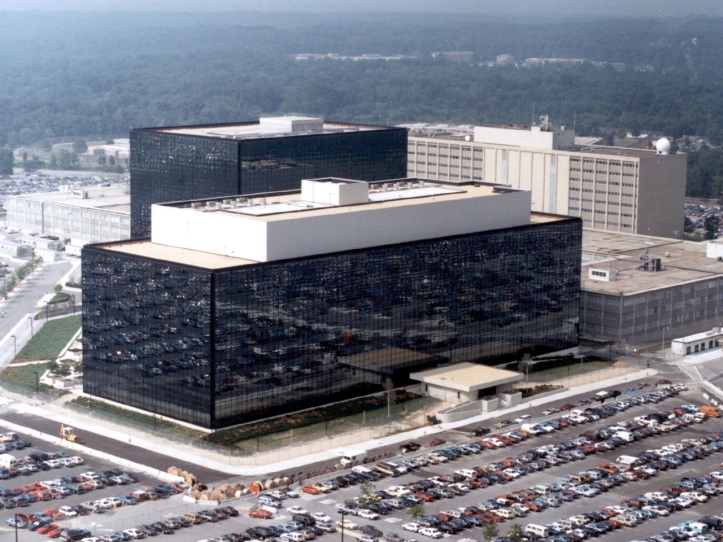
the NSA hackathon came in the wake of the Patriot Act, which targeted terrorism — the big bad bogey man. But in actual fact, terrorism doesn’t even make the top 5 in terms of strategic threats to the US. Bunch of uneducated bible thumpers are going to overthrow the greatest power in the world on their own, without a real power backing them? Yeah right, it takes a lifetime of drinking your own kool aid to believe that.
Forget about criminal accusations — by definition anything the US government does cannot be criminal so that is a waste of breath. I am saying something else:
Why start an arms race against a lesser adversary? This was a Mistake on par with the Iraq war. Why get into the habit of putting spy gear into everyday electronics? Especially when one of our *greater adversaries* (China) happens to also manufacture nearly 100% of the electronics in this country? I mean, HULLO?
What is important is that someone SCREWED UP, big time. Possibly worse than Iraq. We owe Snowden a HUGE thank you for revealing this.
http://spreadanidea.wordpress.com/2014/01/01/nsa-another-factor-to-add-to-the-discussion/
that is a narrow view of who conducts terrorism, dont you think?
arms race against a weaker country? its not much of a race if they are weaker.
why not hack everyday electronics? for cereal, bro. who screwed up what?
we dont owe snowden a fucking thing. real men stay and fight, they dont hand over secrets to the enemy camp who is far more oppressive.
Real men may stay and fight, that makes sense. Here’s an analogy, pardon me if it’s a bit crude.
If you see an out-of-control freight train, and you want to warn the kids in your village to stay off the tracks, the correct strategy is NOT to step in front of the freight train and try to stop it.
Taking on the US government head-on would be a lot like stepping in front of the freight train. No benefit. Pretty lame way to prove your courage. More useful, more effective, and therefore more heroic to warn others of the danger.
That isn’t crude, but the solution isn’t quite on the level. You are right in the sense, that THAT isn’t a viable solution. But what is? I’m afraid that answer tells you too much about how I would solve such a situation, but I’ll have to reserve such a plan’s secrecy for a ‘just in case moment.’ I will however say, the solution is not running off to a bunch of crazy bastards who wants to hijack the train to run into innocents, and provide them with a road maps to inflict maximum damage.